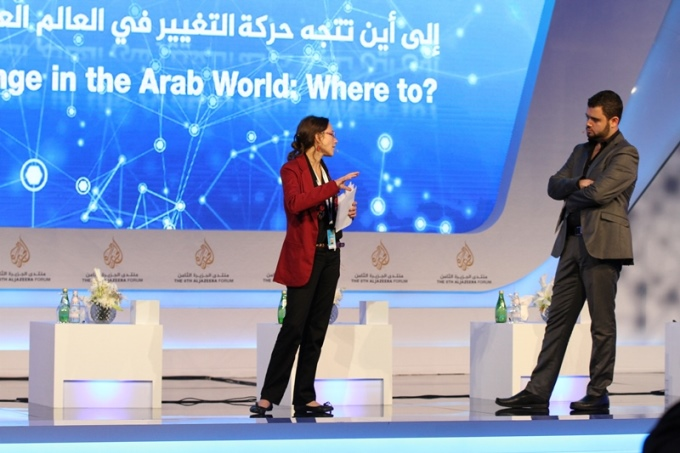
In an extension of the 8th AlJazeera Forum’s Youth Platform, a group of young people from the Arab world and beyond agreed that true change would not be realised by concentrating on political issues alone or self-victimisation and complaining. Rather, they came to the conclusion that youth must improve themselves and insist on participation in the decision-making process through civil organizations and social media.
Marella Quadro, an Argentinian researcher, said that the Arab revolutions surprised South America, and that even though their ideologies sway toward social rights, they reject Western intervention in Arab countries. Similarly, even though South American youth have no clear knowledge of or interest in the Arab world, they possess positions based on their opposition to imperialist policies.
Yousef Abdirahman, a lecturer at Al-Jeel Al-Jadeed University in Somalia, discussed the situation in his country and explained that the conditions in the north are very different from those in the south, where poverty and famine are widespread. He also said Somali society is very aware of developments in the Arab world and follows them on AlJazeera and BBC because of close ties between Egypt and Somalia. Youth in Somalia face challenges; for example, youth in stable areas of Somalia suffer from immigration problems in hope for a better life as well as the problem of “khat” abuse.
Abdulbaki Keskin, a student from Turkey, indicated that most Turkish youth are interested in engaging with conditions in the Arab world. He did notice protests in Turkey were simultaneous with the unravelling of many Arab revolutions. The main reason for this support is the brotherhood between Turkish and Arab nations.
Jamal al-Mulaiki from Yemen said that at the onset of the revolutions, Arab youth restored his interest in his own country's affairs as well as confidence in the possibility of change. However, this was followed by various setbacks in the countries of the Arab Spring, especially in Egypt. He said a great problem is that there is no model of change in Arab countries.
Riyada Akyol of Bosnia said when she observes what is happening in the Middle East, she finds that although the contexts differ, there are common issues, first of which is the tense relationship between the youth and the older generation, particularly those in power. She said there seems to be an unwillingness of the latter to listen to the views of youth, thus causing impediments to change.
Ammar Muhammad from Qatar delved into the possibility of change through social media. He said that although social media had helped launch the Arab revolutions, there is a superficial view of Arab youth's use of social media. Muhammad emphasized that it was not Facebook that created the Egyptian revolution, but the youth who stood in front of tanks – meaning that action is necessary. Positive change through social media will be realized through dialogue, the selection of content that suits the audiences, the utilization of images and the expansion in the way social networking sites are used.

